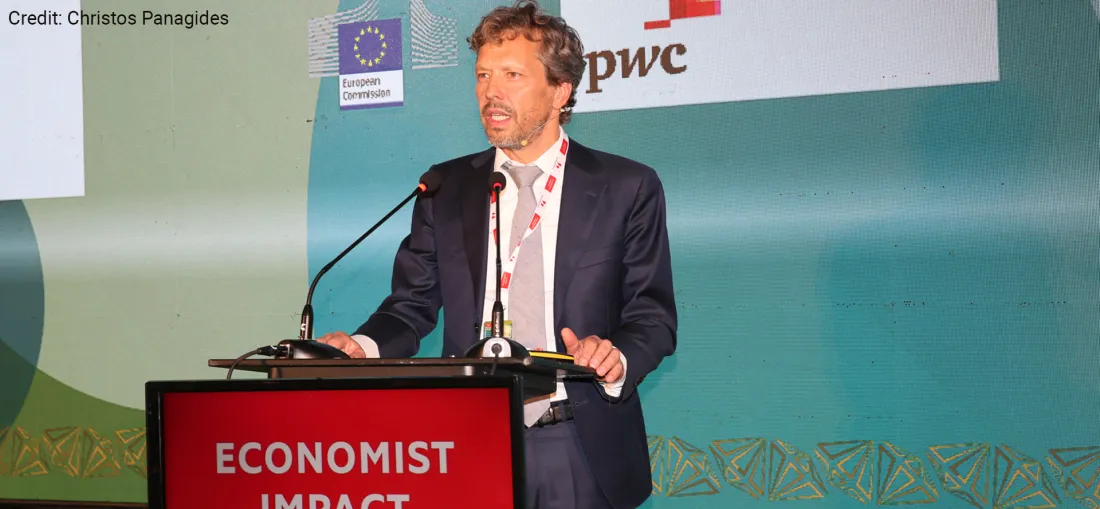Global Economic Outlook: Is the Banking Sector Responding Effectively?

Wim Van Aken, ESM Mission Chief to Cyprus and Senior Advisor to the ESM Chief Economist
Global Economic Outlook: Is the Banking Sector Responding Effectively? Opportunities and Challenges
19th Annual Cyprus Summit
Nicosia, 7 November 2023
(Please check against delivery)
Dear Ladies and Gentlemen, good afternoon.
It is a pleasure to be back in Nicosia.
Global Economic Outlook
The global economy is experiencing a period of extraordinary uncertainty following the pandemic, wars in Eurasia and the Middle East, and the rising interest rate environment. Recent geopolitical developments could add pressures to inflation, and weigh on the economic outlook. Projections for global growth in 2023 and 2024 have been revised slightly downward.1 Despite this uncertainty, the global economy has shown resilience, but risks are looming on the horizon.
The economic landscape in Europe and Cyprus
This is also true for Europe and Cyprus. The euro area economy and the financial system have proven resilient amidst the energy crisis and inflation. Cyprus enjoyed a strong economic performance, and the economic projections remain relatively robust, higher than the euro area average, even if growth has weakened compared to last year.2 Average annual inflation is projected to drop sharply in 2023, going lower than in the euro area.
Cyprus has also been fiscally prudent and able to create fiscal space. A cautious use of energy-related measures has contributed to a significant improvement of Cyprus’ fiscal position this year, with public debt declining further.3
One reason why the euro area has been able to weather the recent shocks relatively well so far is that it could build on the strength and resilience gained after the great financial crisis and euro crisis. The strong reform efforts over the last decade have benefited the economy. Countries, including Cyprus, undertook crucial reforms to address macroeconomic vulnerabilities.
Is the banking sector responding effectively: opportunities and challenges?
Tightening financial conditions, in particular rising interest rates, pose challenges. European banks and supervisors have made great strides in reducing risks and strengthening the system’s resilience to shocks. Rising interest rates have strengthened banks’ profitability and capital position. The European Banking Authority (EBA) conducted a stress test in 2023. The results showed that most institutions could manage a significant deterioration of their loans, even in an adverse recession.
In Cyprus, the banking sector reported the strongest position in a decade. Higher rates have boosted earnings, driving solvency ratios above the euro area average, and so far, asset quality has remained resilient. Since the financial crisis, Cypriot banks have substantially de-risked their balance sheets. Rating agencies upgraded Cypriot banks, which is a clear reflection of the improved situation.
While the reduction in legacy non-performing loans (NPLs) has been significant on bank balance sheets, they stay high compared to the EU average.4 NPLs outside the banking system remain very high, weighing on banks’ new lending opportunities and profitability as borrowers are not able to return to banks as viable clients.5 NPL resolution critically depends on the effectiveness of the foreclosure framework. The numerous legislative proposals that could undermine its effectiveness and the lack of implementation in Cyprus is concerning. Challenges to the foreclosure framework are delaying the workout of bad loans and leave a liability in the economy during times of economic uncertainty.
Cyprus returning to investment grade by all major rating agencies
Cyprus’ fiscal consolidation and reform efforts in other areas have not gone unnoticed by rating agencies. In 2010, the first of a series of downgrades resulted in the 2012 loss of investment grade for the sovereign. 11 years later, on 29 September 2023, Cyprus returned to investment grade by all major rating agencies. This is a milestone worth celebrating. It is the result of remarkable efforts by governments and the people of Cyprus over the last decade to rebuild investor confidence and work towards a more sustainable economy. The upgrade could allow banks and the private sector to benefit from reduced costs of funding and help with investor diversification.
Recovering the investment grade rating is only a first step. Maintaining this positive momentum requires continued determined action by Cypriot governments, now and over the coming years. Continued evidence of fiscal responsibility, a stable financial sector and reform implementation under the country's reform plan and the Recovery and Resilience Plan support this objective. They help strengthen the competitiveness of the economy. Their implementation is key.
Closing Remarks
Let me conclude.
In the short and medium term, Cyprus could continue focusing on fiscal prudence and ensure sufficient fiscal buffers remain in place to mitigate the impact of the expected slowdown of the economy and any future adverse shocks.
In the long term, investment in modernising the economy through digital technologies and innovation are essential to enhance productivity, diversification, and economic growth. In addition, to preserve future economic growth in view of risks stemming from climate change in Cyprus, early adaptation action is important for the economy’s resilience. The transition to green energy helps reinforce that resilience.
Efharisto. Thank you.
1 IMF, October 2023 WEO, predicting global growth to slow from 3.5% in 2022 to 2.9% in both 2023 and 2024. Global inflation is forecast to decline but is not expected to return to target until 2025 in most cases. After a 3.3% increase last year, the IMF expects the euro area growth to slow down to 0.7% in 2023, in line with other institutions (incl. the EC), before picking up to 1.2% in 2024.
2 The latest available institutional forecasts for GDP and inflation are from the IMF (October 2023 WEO). These expect growth in 2023 (2024) to reach 2.2% (2.7%) and inflation to reach 3.5% (2.4%). Overall, these forecasts are also not vastly different from the European Commission’s Spring forecast (May 2023).
3 The European Commission 2023 Spring Forecast projects the debt ratio to fall from 86.5% in 2022 to 72.5% in 2024 and to reach the 60% reference value by 2027. The 2024 Draft Budgetary Plan sees the debt ratio to fall to 74.7% in 2024 and to decline further to 63% in 2026.
4 4% of total loans compared to 1.8%, as per ECB definition.
5 Representing close to 80% of GDP.
Author

Contacts


